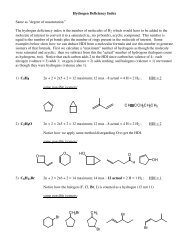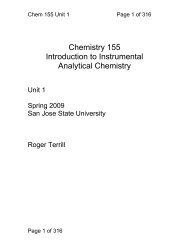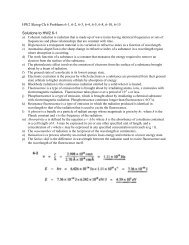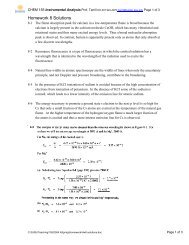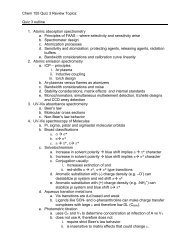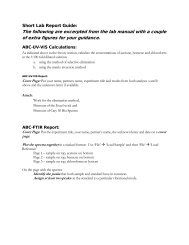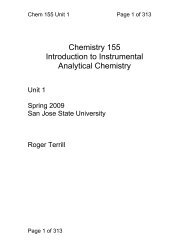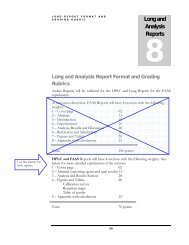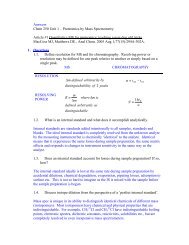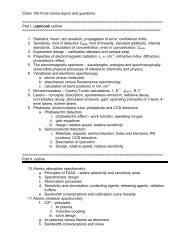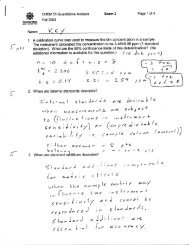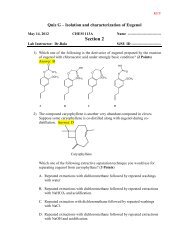Justice Studies - Department of Chemistry - San Jose State University
Justice Studies - Department of Chemistry - San Jose State University
Justice Studies - Department of Chemistry - San Jose State University
Create successful ePaper yourself
Turn your PDF publications into a flip-book with our unique Google optimized e-Paper software.
1. Executive Summary1.1 Description <strong>of</strong> the <strong>Department</strong> and its Programs: The <strong>Department</strong> <strong>of</strong> <strong>Justice</strong> <strong>Studies</strong>(“JS”) <strong>of</strong>fers a B.S. in <strong>Justice</strong> <strong>Studies</strong>, an M.S. in <strong>Justice</strong> <strong>Studies</strong>, two B.S. degrees in ForensicScience, a minor in <strong>Justice</strong> <strong>Studies</strong>, and is one <strong>of</strong> three sponsoring departments for theinterdisciplinary Legal <strong>Studies</strong> Minor. In Fall 2007, the FTE/F for JS is 13.3, FTEA/C is .6, andthe FTE/S is 454.4. JS awarded approximately 159 B.S. degrees (156 in JS and 3 in ForensicSciences) and 20 M.S. degrees in 2005-2006.Since the last program review in Fall 2000, the name <strong>of</strong> the department and its degrees waschanged. Formerly the “Administration <strong>of</strong> <strong>Justice</strong> <strong>Department</strong>,” in 2004 the department changedits name to “<strong>Justice</strong> <strong>Studies</strong>.” The name change was undertaken because the faculty felt the newname better reflected the curriculum, the state <strong>of</strong> the field nationally, the faculty’s areas <strong>of</strong>expertise, and the liberal arts nature <strong>of</strong> the degree (i.e., its foundation in the social sciences andhumanities). Degrees awarded were formerly B.S. and M.S. in Criminal <strong>Justice</strong> Administration,and are now B.S. and M.S. in <strong>Justice</strong> <strong>Studies</strong>. Further discussion is in part 3.1.b below.In addition, since the last program review JS participated with the departments <strong>of</strong>Communication <strong>Studies</strong> and Political Science to develop and implement an interdisciplinaryminor in Legal <strong>Studies</strong>. JS also added two interdisciplinary B.S. degrees in Forensic Science(one concentration in <strong>Chemistry</strong>, and one concentration in Biology). The Forensic Scienceprogram is not included in this Program Review. It will require a separate review schedule andprocess, as it is also undergoing the steps necessary to become an accredited program with itsnational accrediting body, and it was not formally put into place until the 2003-04 academicyear. Furthermore, given that program’s core curriculum in the sciences, it will likely require areview process that includes the participation <strong>of</strong> the Biology and <strong>Chemistry</strong> departments, theDean <strong>of</strong> Science, and an external reviewer team with the requisite scientific expertise.1.2 Synopsis <strong>of</strong> the Previous Program Review RecommendationsThe external reviewer recommended the following: (1) instituting college-based graduate staffsupport to coordinate with Graduate <strong>Studies</strong> and serve all CASA grad students; (2) addressingspace constraints to enable faculty to work more productively; (3) exploring a college-basedcentral advising system; (4) addressing course overlap between SJ and sociology; (5) and at theuniversity level, acquiring essential library resources (journals, books, data sets, referencematerials) to support the continuation <strong>of</strong> graduate education.CASA Dean Ego recommended the following for the AJ (now JS) <strong>Department</strong>: (1) activeparticipation in the joint doctoral program with UC Davis and CSU Fresno; (2) explore ways t<strong>of</strong>und graduate assistant positions; (3) pursue creative scheduling to meet student demands,including experimenting with <strong>of</strong>fering courses at non-traditional times, at <strong>of</strong>f-campus sites, andusing online instructional formats; (4) explore a curriculum emphasis in technology,environmental, and corporate crime to strengthen ties between the local community and thedepartment; (5) explore ways to fund staff assistance for the graduate program; (6) pursueupgrading classrooms to “smart classrooms”; (7) review library resources in order to enhance1




